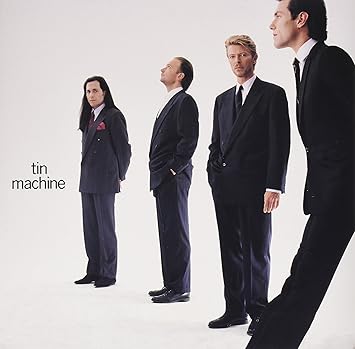“Heaven’s In Here” sets the tone of Tin Machine from the start, with a live sound and a repeated riff over several minutes, split up by pounding drums and chaotic solos. The title track plows through until the slightly gentler “Prisoner Of Love” comes in, much closer to the classic Bowie sound. “Crack City” really got under people’s skin, with its four-letter lyrics and use of half of the “Wild Thing” chords. “I Can’t Read” continues the feeling of desperation; skeptics thought the line “I can’t read sh-t” sounded more like “I can’t reach it”. The side ends with the relentless “Under The God”, its riff familiar from “I Wish You Would”, which Bowie fans knew from Pin Ups. If you can’t smile when he rails against “right-wing dicks in their boiler suits”, don’t bother with side two.
“Amazing” is something of a love song, then it’s off to unpredictable cover territory with a stomp through John Lennon’s “Working Class Hero”, most likely included for its bad language. “Bus Stop” is fairly short (a tongue-in-cheek live “country version” is added to the reissue) before the noise assault of “Pretty Thing” and the chaos of “Video Crime”. “Run” and “Sacrifice Yourself” weren’t included on the LP (probably due to space considerations) but luckily “Baby Can Dance” is the excellent closer for all versions.
Those of us who didn’t write it off as noise thought Tin Machine was Bowie’s best album in years—certainly of the decade—and not just because he swore a blue streak over those heavy chords. There were no gimmicks or dated synthesizers, just cut-up lyrics and relentless guitar. Of course, he insisted that the band was here to stay. And of course, things would change.
Tin Machine Tin Machine (1989)—4
1995 CD reissue: same as 1989 cassette/CD, plus 1 extra track

Bowie to me in 1993: "I think that is one of the best albums of the late '80s, without doubt, without reservation, and I suspect it will be looked back as such in ten years probably like Low was. Listening to it against some of the more contemporary so-called rock bands, makes them sound pretty timid in their way."
ReplyDelete